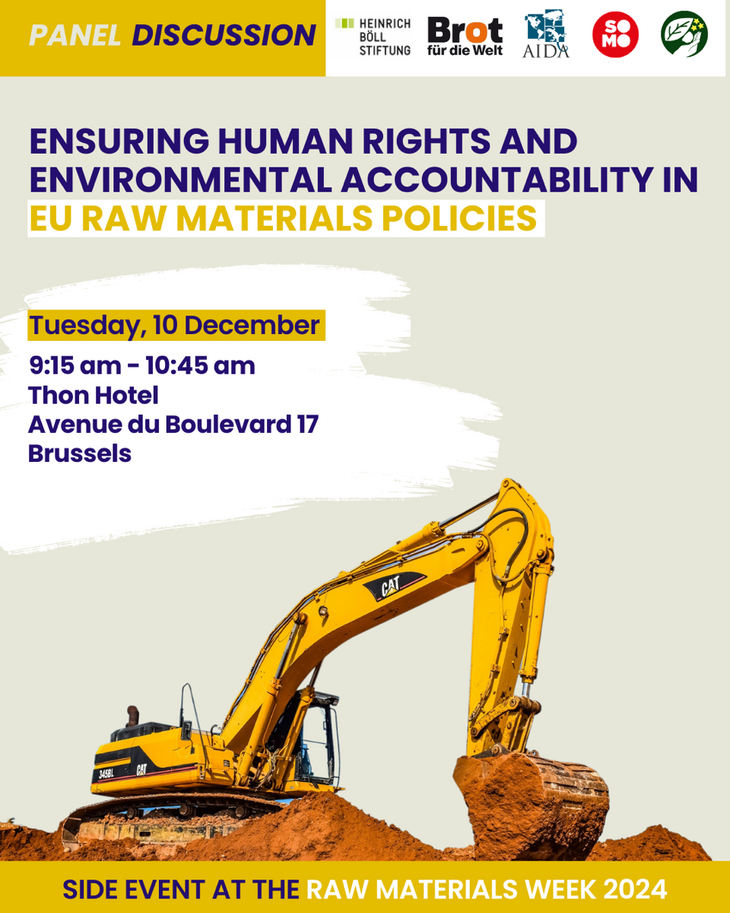Panel discussion: Ensuring Human Rights and Environmental Accountability in EU Raw Materials Policies - The Interplay of the CSDDD, Batteries Regulation and the CRMA
When: December 10, 2024, 9.15 am -10.45 am
Where: Thon Hotel (Avenue du Boulevard 17, 1210 Brussels) How: in-person
Registration: https://shorturl.at/x4HN8
Organisers: Brot für die Welt, SOMO, AIDA, Heinrich Böll Foundation, EU Raw Materials Coalition
In May 2024 the Council of the EU adopted the Corporate Sustainability Due Diligence Directive (CSDDD) requiring businesses to exercise human rights and environmental due diligence (HREDD). Almost at the same time the Critical Raw Materials Act (CRMA) entered into force with the objective of securing EU’s access to a secure and sustainable supply of critical raw materials (CRMs). In August 2025, the HREDD requirements of the EU Batteries Regulation will come into force.
In the meantime, serious and widespread human rights abuses and environmental degradation continues to occur in CRMs supply chains. For instance, the violation of the right to free, prior and informed consent of Indigenous Peoples, and the shrinking space for rightsholders and civil society are putting human rights and environmental defenders objecting to mining projects at risk. This is the case e.g. in Argentina where the context of the expansion of lithium extraction is not only affecting biodiversity and the availability and quality of water in Indigenous territories, but is also causing impacts on ecosystems that are strategic for climate adaptation and triggering complex risks for the protection of rural communities and environmental defenders.
Despite its sustainability requirement, the CRMA provides very weak human rights and environmental protection while pushing for the expansion of CRM projects and trade deals with resource rich countries, without challenging the EU's high demand for transition minerals. Thus the rigorous implementation of regulations like the CSDDD or the EU Batteries Regulation are of vital importance and can address some severe loopholes when implementing the CRMA. In this event, we aim to explore several key questions:
- How can the EU ensure that planned strategic projects and partnerships are implemented with rigorous human rights and environmental standards, fully respecting the rights of Indigenous Peoples?
- What role can the CSDDD play in this effort, and why is a swift and rigorous transposition by Member States essential?
- How does the global scramble for raw materials impact communities at the local level? What further measures are needed to achieve a genuinely just global transition that prioritises people and the environment?
- What are the expectations of civil society for the new European Parliament, EU Member States and global corporations regarding the implementation of the CRMA, the CSDDD, the Batteries Regulation and beyond?
Speakers
Susanne Szech-Koundouros, German Federal Ministry of Economics and Climate Protection (BMWK)
Yeny Rodriguez, Interamerican Association for Environmental Defense (AIDA)
Alejandro Gonzalez, SOMO
Member of European Parliament (MEP), (tbc)
Facilitation: Teresa Hoffmann, Fundación Ambiente y Recursos Naturales (FARN)
« zurück zur Übersicht



